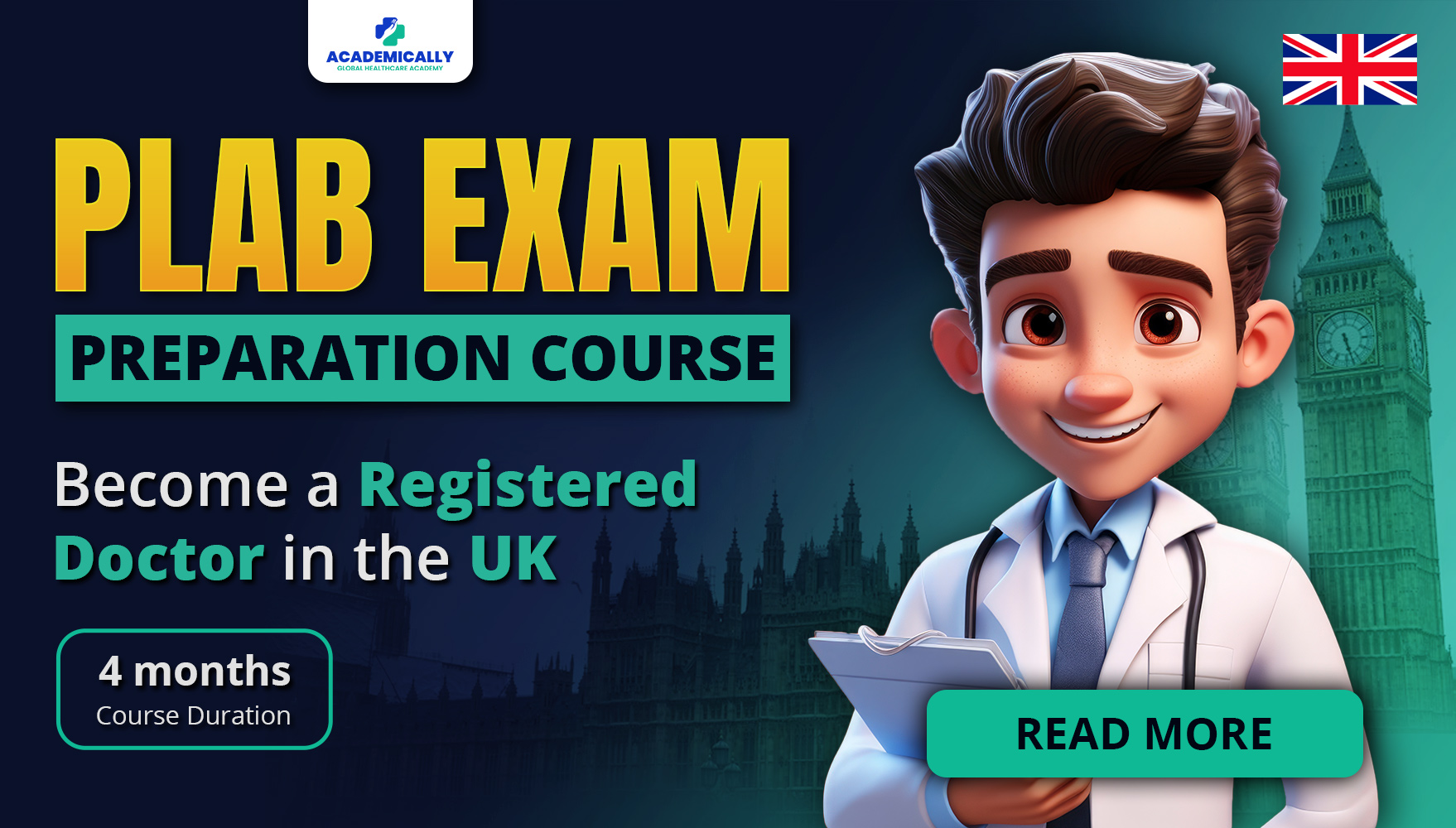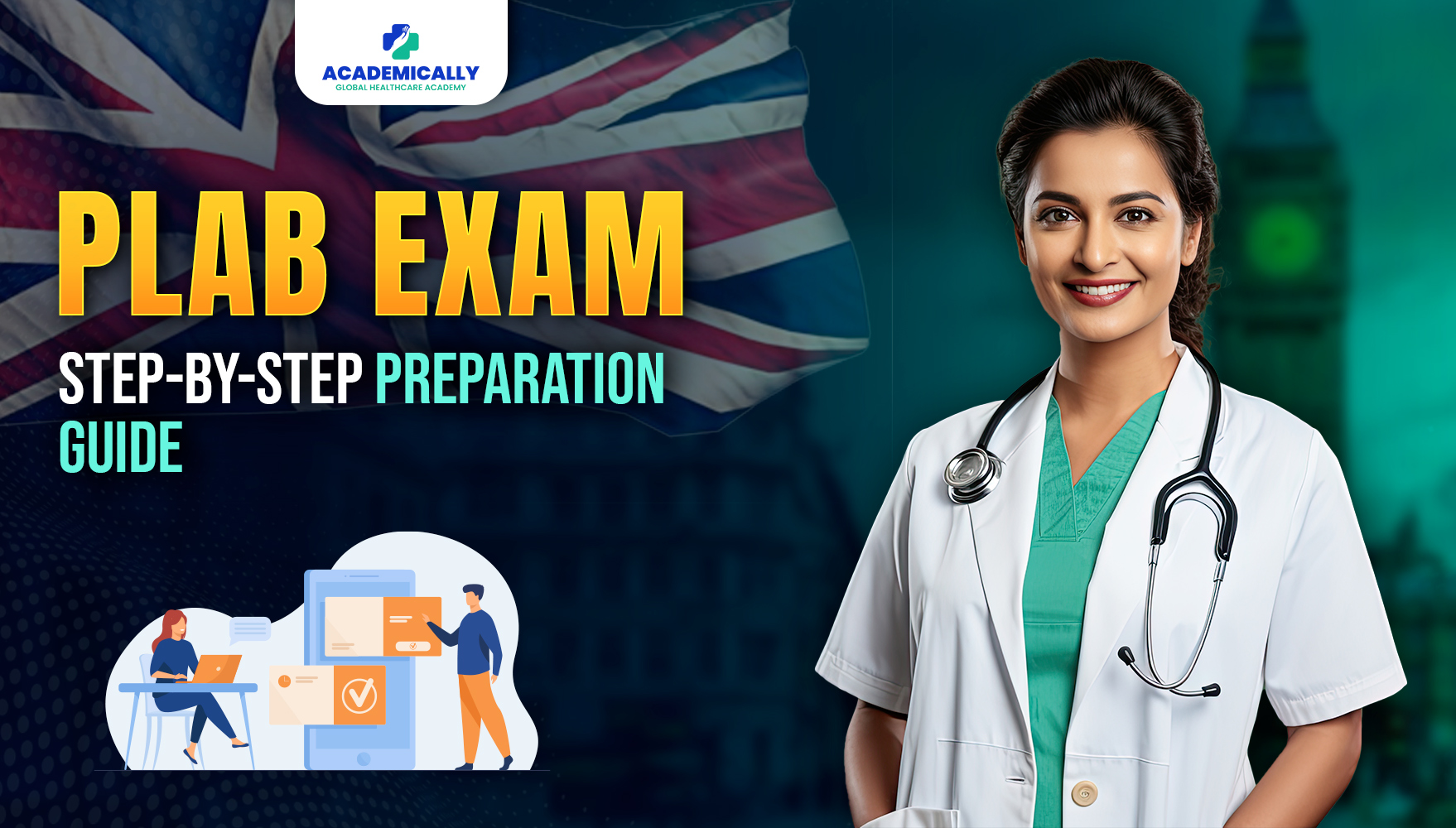Understand the PLAB Exam Structure
Before diving into preparation, it's essential to understand the PLAB exam's structure. The PLAB exam consists of PLAB 1 and PLAB 2.
PLAB 1
PLAB 1 is a written exam comprising 180 multiple-choice questions to be completed in 3 hours. Each question presents a scenario requiring candidates to choose the correct answer from five options. Covering diverse medical topics, the exam assesses candidates' knowledge and decision-making skills within the allotted time.
PLAB 2
PLAB 2 is conducted at the clinical assessment centre in Manchester, featuring clinical scenarios that simulate real-life consultations. In this three-hour exam, candidates navigate through multiple stations, each lasting six minutes. The exam includes interactions with actors portraying patients or healthcare professionals, assessing candidates' application of knowledge and skills in practical settings.
Also Read: PLAB Exam Pattern and Syllabus
Create a Study Plan
Identify Weak Areas and Prioritise
Begin by thoroughly assessing your knowledge and skills in each subject relevant to the PLAB exam. Pinpoint your weaker areas and prioritise them in your study plan. Whether it's a specific medical topic or question format, allocating more dedicated time to these areas ensures targeted improvement.
Time Allocation and Subject Distribution
Once you've identified your weaker areas, allocate dedicated time for each subject in your study plan. Ensure you distribute your study hours strategically, giving more time to subjects or topics needing focused attention.
Structured Study Sessions with Goals
Break down your study plan into structured study sessions. Define specific goals for each session, making them achievable and aligned with your preparation timeline. For instance, you might set a goal to review a particular medical topic, complete a set of practice questions, or simulate a timed exam. This structured approach ensures that you cover the entire exam syllabus systematically.
Utilise Official Resources
PLAB Blueprint
The PLAB blueprint is offered by the General Medical Council (GMC), which serves as a comprehensive guide outlining the content and format of the PLAB exam.
It provides a detailed breakdown of the subjects and topics, allowing candidates to align their study plan with the exam's scope. By utilising the official PLAB blueprint, candidates gain insights into the specific areas they need to focus on, ensuring a targeted and efficient preparation.
Exam Feedback Reports
Exam feedback reports provided by the GMC offer valuable information on the performance of previous candidates. Analysing these reports can provide insights into common pitfalls, frequently tested topics, and the overall difficulty level of the exam.
Official Practice Materials
The GMC offers official practice materials, including sample questions and practice exams, designed to simulate the PLAB exam environment. These materials closely mirror the actual exam format, allowing candidates to familiarise themselves with the question types, time constraints, and overall structure.
Books and Online Resources
Invest in reputable PLAB study materials. Books like the Oxford Handbook of Clinical Medicine and online resources like Pastest and BMJ OnExamination can be beneficial. Utilise a variety of resources to gain a comprehensive understanding of the topics.
Practice, Practice, Practice
Regular practice is vital to success. Solve various PLAB-style questions to reinforce your knowledge and improve time management skills. Mock exams can simulate actual exam conditions, providing valuable experience and helping identify weak areas.
Stay Updated with Medical News
Keep abreast of current medical news and updates. The PLAB exam may include questions related to recent advancements and guidelines. Subscribe to reputable medical journals and online platforms to stay informed.
Clinical Skills Preparation
For PLAB 2, focus on honing your clinical and communication skills. Practice OSCE scenarios with study partners, simulate patient encounters, and work on effective communication. Develop a systematic approach to history-taking, examination, and presenting cases.
Seek Guidance and Support
Online Forums and Social Media Groups
Explore online forums and social media groups dedicated to PLAB candidates. Platforms like Reddit, Facebook, or dedicated PLAB forums offer a space to connect with others through the same preparation process.
Engaging in discussions allows candidates to share valuable insights, exchange study tips, and seek advice from those who have successfully navigated the PLAB journey or are currently in the same preparation phase.
Discussion of Challenges and Experiences
Participating in discussions about challenges and experiences can offer a wealth of information. Candid conversations about specific difficulties, exam strategies, and personal triumphs provide a broader perspective on the PLAB journey.
Learning from the experiences of others can help candidates anticipate potential obstacles, refine their study plans, and gain a realistic understanding of what to expect during the exams.
Study Groups and Study Buddies
Consider forming or joining study groups with fellow PLAB candidates. Collaborating allows for shared learning, diverse perspectives, and mutual support.
Study groups provide an opportunity to discuss complex medical concepts, simulate practice scenarios, and reinforce understanding through collective efforts. Having a study buddy or joining a PLAB coaching course offers personal support, motivation, and expert guidance, enhancing the overall study experience.
Academically, it has a course exclusively designed for PLAB aspirants. The PLAB Exam Preparation course offers online training by PLAB-qualified doctors, previous year's question papers, and many more.

Time Management
Develop effective time management strategies, especially during the exam. Practice answering questions within the allotted time for each section. Time management is crucial for completing the exam successfully.
Revision and Self-Assessment
Periodically revise previously covered topics to reinforce learning. Engage in self-assessment regularly to gauge your progress. Identify weak areas and allocate additional time to review and strengthen your knowledge.
Stay Healthy
Maintaining physical and mental well-being is crucial during the preparation period. Ensure adequate sleep, regular exercise, and a healthy diet. Managing stress through relaxation techniques and breaks is vital for peak performance.
Conclusion
Preparation for the PLAB exam requires dedication, strategic planning, and a comprehensive approach.
Candidates can enhance their chances of success by understanding the exam structure, utilising official resources, practising consistently, and focusing on clinical skills.
Remember, success in the PLAB exam is about knowledge, practical application, and communication skills.
Good luck on your PLAB journey!
Fill up this form for a free one on one counselling session.






